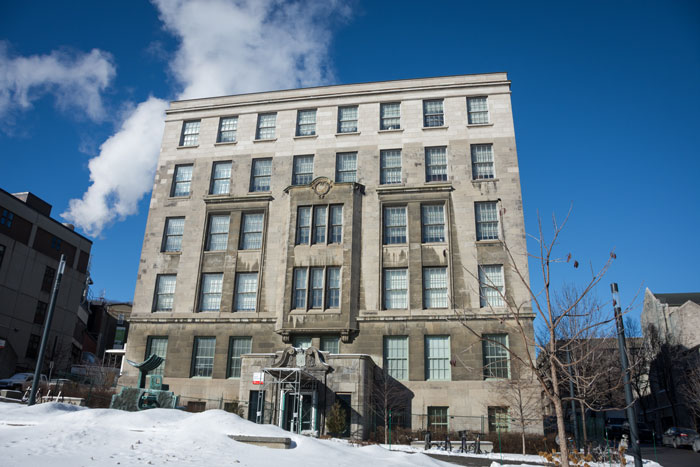McGill’s Board of Governors (BoG) held its fifth annual Board-Student forum on March 1, giving students and Governors the opportunity to discuss their respective roles at McGill. In the first part of the forum, Board members were assigned tables while students rotated, giving students a chance to debate issues with every board member.
Following this conversation period, six student groups, including the Black Students’ Network (BSN), McGill Student Emergency Response Team (M-SERT), and Divest McGill gave short presentations on their objectives and logistical needs for 2018. Some used the opportunity to voice their concerns about students’ ability to stay informed about the BoG’s proceedings—particularly concerning the Committee to Advise on Matters of Social Responsibility’s (CAMSR) terms of reference, which are currently under review.
BSN presents its mandates and a forthcoming fee levy campaign
The BSN is a Students’ Society of McGill University (SSMU) service that aims to make McGill safe and accessible for black students and to support their academic success, mental health, and physical well-being. Next year, BSN will push for the implementation of an Africana Studies program at McGill. This year they will hold a fee levy referendum, aiming to increase their student fee from $0.40 to $1.00 for full-time students.
“[The fee levy] will support the institutionalization of our service,” Christelle Tessono, vice president political for BSN, said in their presentation at the forum. “It’s very hard to continue providing so many services when you’re not paid.”
Discussion with Divest McGill over the CAMSR Terms of Reference
Divest McGill’s presentation primarily focused on their concerns regarding the proposed changes to the CAMSR terms of reference, which would prohibit it from endorsing investments based on social or political considerations. CAMSR meets on an ad hoc basis and is tasked with advising the BoG on investing in a socially responsible manner.
Divest McGill previously interrupted the BoG’s meeting on Dec. 12 to protest the proposal. More recently, on Feb. 15, the BoG held a community session in which members of the McGill community were able to ask questions about the changes to the mandate. However, questions related to the wording of the new mandate were rejected and referred to CAMSR during its confidential meeting several days later. Associate Professor Edith Zorychta, who sits on the Nominating, Governance and Ethics committee, explained during the forum tabling session why CAMSR’s meetings are not open to the public.
“Every institution has to have some kind of watchdog to make decisions about the finances,” Zorychta said. “It’s a conflict of interest if you [have an open meeting] and you’re making decisions about hiring administration, what their salaries are going to be.”
However, Divest McGill members present at the meeting asserted that CAMSR’s mandate is not about finances or hiring decisions. They called upon CAMSR to hold open sessions and make its minutes public, like the BoG does.
“[CAMSR’s] argument [for holding closed sessions] is that people express their truest ideas in private,” Divest McGill member Jed Lenetsky said. “But they are decision-makers for the university and they are accountable to students.”
Divest presented several recommendations for the proposed changes to CAMSR in a letter, including keeping the frequency of CAMSR reviews at every three years rather than the proposed every five years and removing the proposed change to the mandate. Lenetsky and Annabelle Couture-Guillet believe that the BoG did not conduct thorough research before submitting the proposed changes.
“[The BoG] consulted six experts,” Lenetsky said. “It was only after [Divest] held a week-long sit-in outside Suzanne Fortier’s office that the BoG released [the experts’] names and testimonies, and only five out of six [were released].”
In addition to greater transparency, Divest is pushing for more informed discussions.
“These experts were from McGill, with expertise in their own fields, people from the economics department, a green chemist, experts in sustainability,” Lenetsky said. “But not experts in ethical investing, which is what CAMSR is all about.”
Alice Lefebvre, student representative to CAMSR, assured during the forum tabling session that student voices have been heard through community consultations.
“I’ve been talking to students and other members of the McGill community about the proposed changes, and really listening to why the changes were made,” Lefebvre said. “I’ve seen both sides [of the issue], so [we can] make the best decision.”
Lefebvre explained that, although only one student representative sits on CAMSR, this position is sufficient to convey student interests.
“There aren’t many students on the BoG, and CAMSR is a small committee,” Lefebvre said. “I feel that CAMSR received a lot of comments on the changes from students. Even if I was the only student representative on the committee, there’s still openness.”
CAMSR will meet again on March 21 to discuss the changes to its mandate.








